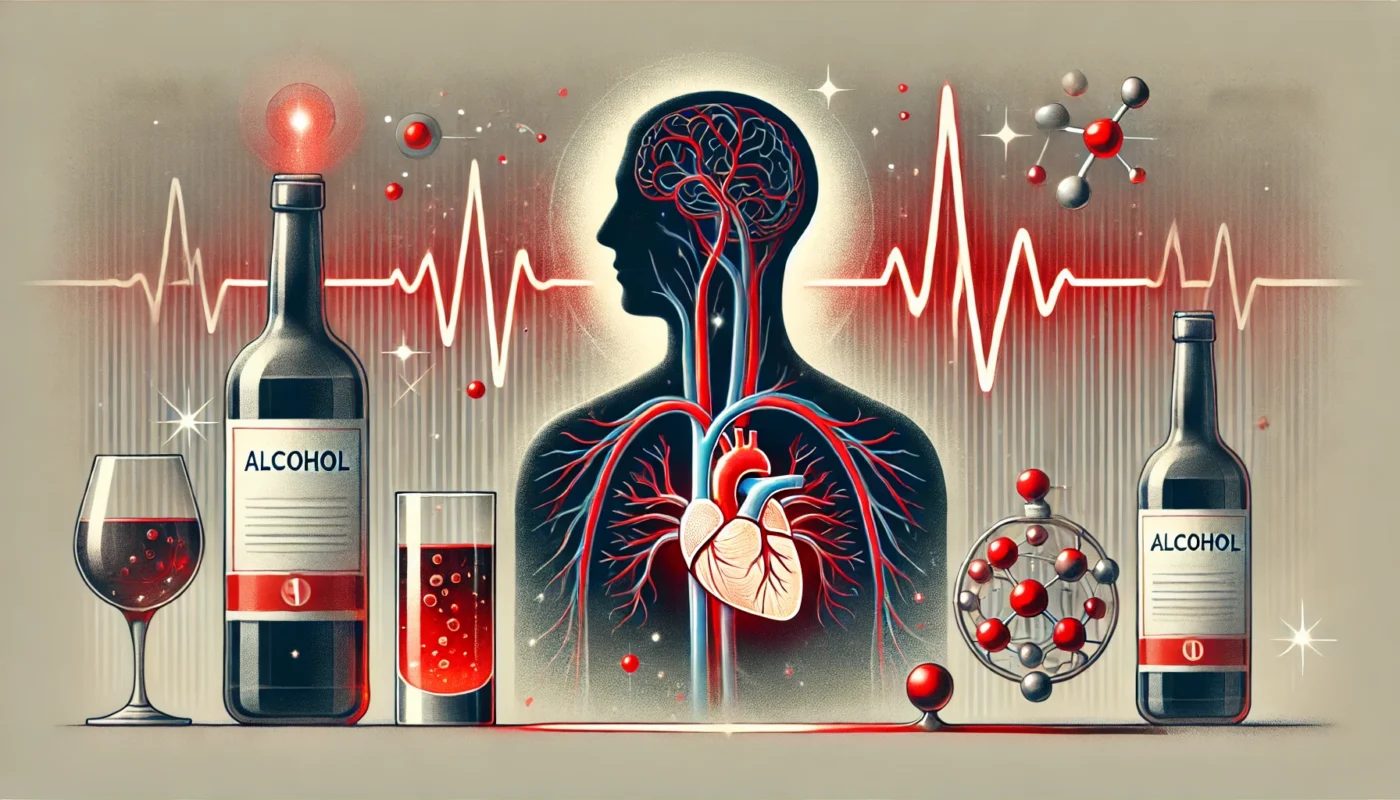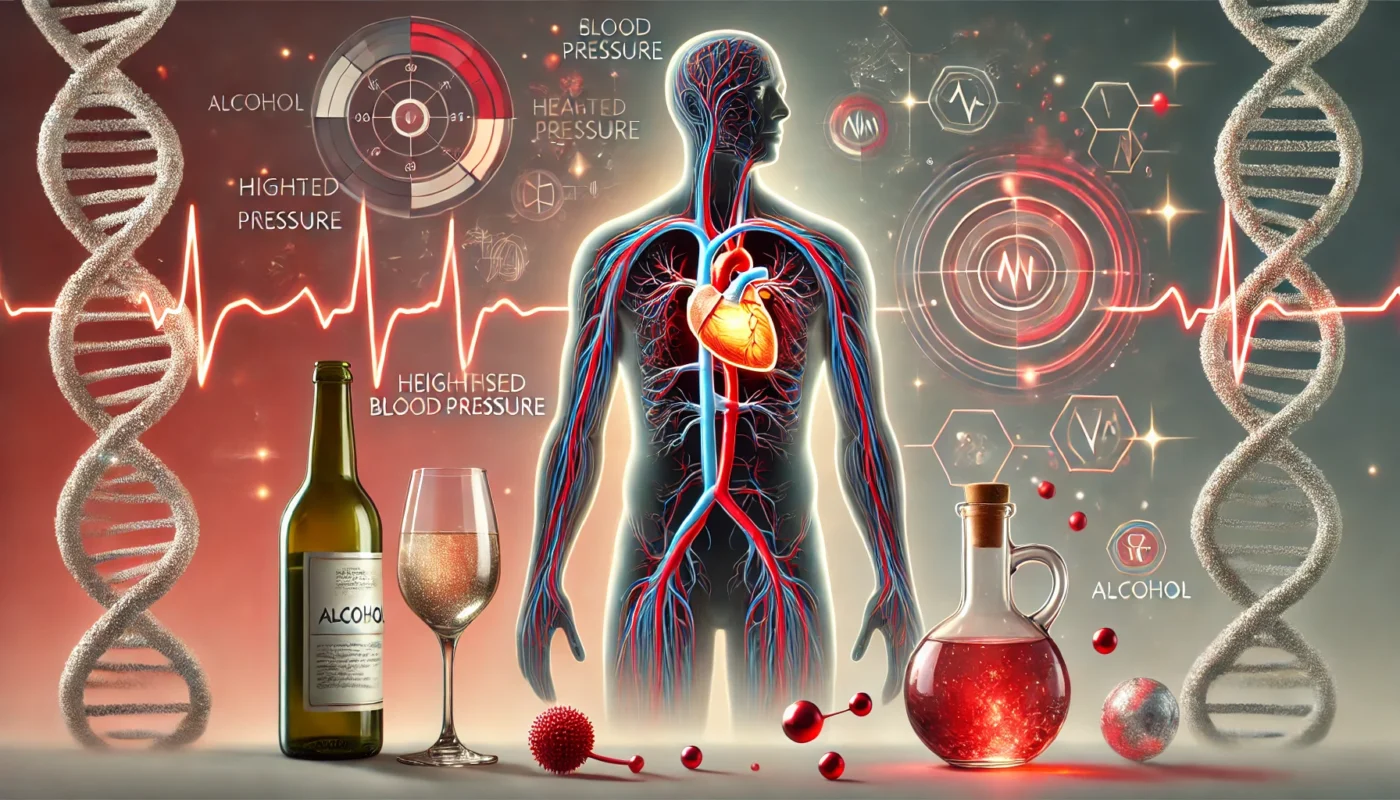Hypertension, or high blood pressure, affects more than 1.28 billion people globally and is a leading cause of cardiovascular diseases, stroke, and kidney failure, according to the World Health Organization (WHO). It is characterized by persistently elevated blood pressure, typically defined as a reading of 130/80 mmHg or higher. While lifestyle factors such as diet and exercise are well-known contributors to hypertension, alcohol consumption is another critical factor that warrants attention. Many people consume alcohol as part of social or cultural practices, but understanding its impact on blood pressure is essential for effective hypertension management. This article examines the complex relationship between alcohol consumption and hypertension, the risks and benefits of drinking, and evidence-based guidelines for drinking responsibly.
You May Also Like:
The Importance of Hydration in Managing Hypertension
Screen Time and Hypertension: Is There a Connection?
The Role of Alcohol in Hypertension: Can You Drink Responsibly? is an original (HSLHealing) article.
Understanding Alcohol’s Impact on Blood Pressure
Alcohol affects blood pressure through various physiological mechanisms, including its impact on the nervous system, vascular health, and hormonal regulation. While moderate drinking may offer some cardiovascular benefits, excessive or chronic alcohol consumption is strongly associated with an increased risk of hypertension.
Acute Effects of Alcohol
Short-term alcohol consumption can temporarily lower blood pressure by dilating blood vessels. However, this effect is typically followed by a rebound increase in blood pressure as the body metabolizes the alcohol. A study published in Hypertension (2015) found that consuming more than two standard drinks in a single sitting raised systolic blood pressure (SBP) by 5–6 mmHg within hours of consumption.
Chronic Effects of Alcohol
Regular, heavy drinking leads to sustained increases in blood pressure. Alcohol activates the sympathetic nervous system, which increases heart rate and constricts blood vessels, raising blood pressure over time. Additionally, alcohol’s calorie content contributes to weight gain, a major risk factor for hypertension.
- Evidence: A meta-analysis in The Journal of Clinical Hypertension (2018) found that individuals consuming more than three standard drinks per day had a 50% higher risk of developing hypertension compared to non-drinkers or light drinkers.
Healthy fats for a healthy heart—Omega-3 reduces inflammation and improves blood pressure levels.

The Relationship Between Alcohol and Hypertension
The link between alcohol consumption and hypertension is dose-dependent, meaning the quantity and frequency of alcohol intake play a significant role. Below, we explore how different levels of alcohol consumption affect blood pressure.
1. Moderate Drinking
Moderate alcohol consumption is defined as up to one drink per day for women and up to two drinks per day for men, according to the American Heart Association (AHA). Some studies suggest that moderate drinking may have a neutral or even slightly beneficial effect on cardiovascular health.
- Potential Benefits:
Moderate alcohol intake, particularly from red wine, has been associated with improved endothelial function and reduced arterial stiffness. A study in Circulation (2017) reported a modest reduction in SBP among individuals consuming moderate amounts of wine due to the presence of polyphenols, such as resveratrol. - Caution:
Even moderate drinking should be approached carefully by individuals with hypertension, as alcohol’s effects vary based on individual health conditions and genetics.
2. Heavy Drinking
Heavy alcohol consumption—defined as more than three drinks per day or frequent binge drinking—is a significant risk factor for hypertension. Chronic heavy drinking leads to structural and functional changes in blood vessels, increasing vascular resistance.
- Evidence:
A longitudinal study in Hypertension Research (2019) found that heavy drinkers were twice as likely to develop hypertension as moderate drinkers or abstainers. The researchers attributed this to alcohol-induced oxidative stress and increased sympathetic nervous system activity.
3. Binge Drinking
Binge drinking, defined as consuming four or more drinks for women and five or more drinks for men within two hours, causes sharp spikes in blood pressure. These episodes increase the risk of cardiovascular events, even in otherwise healthy individuals.
- Findings:
Research in The American Journal of Hypertension (2020) showed that people who engaged in weekly binge drinking had a 25% higher risk of hypertension compared to non-binge drinkers.

Mechanisms Linking Alcohol and Hypertension
Alcohol contributes to hypertension through several interconnected pathways:
- Sympathetic Nervous System Activation
Alcohol stimulates the sympathetic nervous system, leading to vasoconstriction and increased cardiac output, both of which elevate blood pressure. - Impaired Vascular Function
Chronic alcohol use damages the endothelium, the inner lining of blood vessels, reducing their ability to dilate properly. - Hormonal Imbalances
Alcohol disrupts the renin-angiotensin-aldosterone system (RAAS), a hormonal system that regulates blood pressure and fluid balance, leading to higher blood pressure. - Increased Caloric Intake
Alcohol is calorie-dense, with one gram providing seven calories. Excessive consumption contributes to weight gain, a significant risk factor for hypertension.
Drinking Responsibly with Hypertension
While abstaining from alcohol entirely is the safest option for individuals with hypertension, moderate consumption may be permissible for some. Here are evidence-based strategies for drinking responsibly:
1. Stick to Recommended Limits
Follow the AHA’s guidelines of no more than one drink per day for women and two drinks per day for men. For individuals with hypertension, even lower limits may be advisable.
2. Choose Low-Alcohol Options
Opt for beverages with lower alcohol content, such as light beers or diluted cocktails, to reduce the risk of overconsumption.
3. Avoid Binge Drinking
Refrain from consuming large quantities of alcohol in a short period, as this can cause dangerous spikes in blood pressure.
4. Pair Alcohol with Food
Consuming alcohol with meals can slow its absorption into the bloodstream and mitigate its effects on blood pressure.
5. Monitor Blood Pressure
Check your blood pressure regularly, especially after consuming alcohol, to understand how your body responds.

The Role of Nutritional Supplements in Alcohol-Related Hypertension
Certain nutritional supplements can support vascular health and mitigate some of the negative effects of alcohol on blood pressure. Below are five supplements with evidence-based benefits:
1. Coenzyme Q10 (CoQ10)
CoQ10 is a potent antioxidant that supports endothelial function and reduces oxidative stress. A study in Hypertension Research (2016) found that CoQ10 supplementation reduced SBP by 11 mmHg in individuals with hypertension.
2. Omega-3 Fatty Acids
Omega-3s improve arterial flexibility and reduce inflammation, counteracting the vascular damage caused by alcohol. A meta-analysis in Hypertension (2018) reported a 4 mmHg reduction in SBP with omega-3 supplementation.
3. L-arginine
L-arginine is an amino acid that supports nitric oxide synthesis, improving blood flow and reducing blood pressure. A study in Nutrition Journal (2017) showed a 5 mmHg reduction in SBP with L-arginine supplementation.
4. Magnesium Glycinate
Magnesium helps relax blood vessels and reduces vascular resistance. A randomized controlled trial in Magnesium Research (2014) found that magnesium supplementation lowered SBP by 5 mmHg in hypertensive participants.
5. Hibiscus Extract
Hibiscus enhances nitric oxide production, promoting vascular relaxation. Research published in The Journal of Nutrition (2010) demonstrated a 6 mmHg reduction in SBP among individuals consuming hibiscus tea daily.
Heart-powered CoQ10—Boosts cellular energy to lower blood pressure and improve vascular health.

Alcohol and Hypertension: Myths and Facts
Myth: Red Wine Is Always Heart-Healthy
While moderate red wine consumption may have cardiovascular benefits, excessive intake negates these effects and raises blood pressure.
Fact: Alcohol-Free Days Are Beneficial
Taking alcohol-free days allows your body to recover and reduces the overall impact of alcohol on your blood pressure.
Myth: Switching to Beer or Spirits Reduces Risk
The risk of hypertension is more closely related to the amount of alcohol consumed, not the type.
Conclusion
The relationship between alcohol consumption and hypertension is complex, with dose and drinking patterns playing critical roles. While moderate drinking may have some cardiovascular benefits, excessive or frequent alcohol use increases the risk of hypertension and related complications. For individuals with hypertension, responsible drinking—if permitted by a healthcare provider—requires adherence to strict guidelines, regular monitoring, and a balanced lifestyle. When combined with other strategies, such as a heart-healthy diet, regular exercise, and targeted nutritional supplements, individuals can better manage their blood pressure and overall cardiovascular health. Making informed choices about alcohol is an essential step toward long-term well-being.

References
- Hypertension Research. (2016). Effects of CoQ10 supplementation on blood pressure in hypertensive patients. Hypertension Research. Retrieved from https://www.nature.com/hr
- The Journal of Clinical Hypertension. (2018). Alcohol consumption and risk of hypertension: A meta-analysis. The Journal of Clinical Hypertension. Retrieved from https://www.onlinelibrary.wiley.com
- Circulation. (2017). Effects of moderate wine consumption on blood pressure: A randomized study. Circulation. Retrieved from https://www.ahajournals.org
- The Journal of Nutrition. (2010). Hibiscus tea and its impact on blood pressure. The Journal of Nutrition. Retrieved from https://academic.oup.com
- Hypertension. (2018). Omega-3 fatty acids and blood pressure control: A meta-analysis. Hypertension. Retrieved from https://www.ahajournals.org
Important Note: The information contained in this article is for general informational purposes only, and should not be construed as health or medical advice, nor is it intended to diagnose, prevent, treat, or cure any disease or health condition. Before embarking on any diet, fitness regimen, or program of nutritional supplementation, it is advisable to consult your healthcare professional in order to determine its safety and probable efficacy in terms of your individual state of health.
Regarding Nutritional Supplements Or Other Non-Prescription Health Products: If any nutritional supplements or other non-prescription health products are mentioned in the foregoing article, any claims or statements made about them have not been evaluated by the U.S. Food and Drug Administration, and such nutritional supplements or other health products are not intended to diagnose, treat, cure, or prevent any disease.

